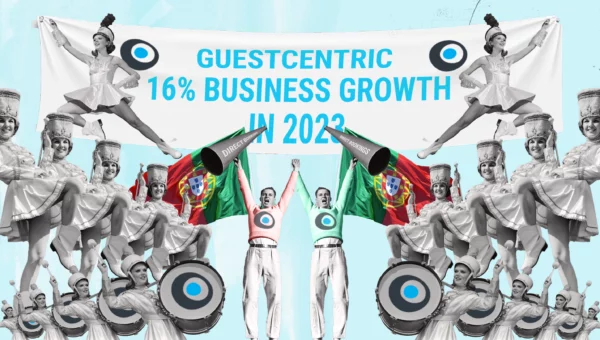When will Business Travel Recover?
Reading Time: 4 minutesNearly two years since the world plunged into lockdown, travel and hotel bookings continue to show strong recovery, exceeding the record-breaking year of 2019. But although international travel is resuming with a vengeance, the business travel segment (crucial for City Center Hotels and Groups surveyed) is showing a much slower recovery.
In this article, we take a look at when business travel is expected to recover, and what hotels can do to redefine their offering in the meantime.
When will Business Travel Recover to Pre-Pandemic Levels?
Although travel is growing and in some cases exceeding pre-pandemic levels, this recovery has largely been driven by the leisure market. However, our October 2021 Hotelier PULSE survey results show increased optimism on how soon business travel will recover.
Over 93% of Hoteliers surveyed in October 2021 expect domestic business travel to reach pre-pandemic levels in 2022 (vs 46.7% in September 2021). Nearly 47% expect the same for international business travel (vs 32,3% in September 2021).
A major new report by the World Travel & Tourism Council (WTTC), published in early November 2021, forecasts business travel spending to reach two-thirds of pre-pandemic levels in 2022. “Business travel has been seriously hit but our research shows room for optimism with the Asia Pacific and the Middle East first off the starting blocks,” WTTC CEO & President Julia Simpson said.
Considering this year and next, the report’s data shows which regions around the world are leading the revival in business travel, led by the Middle East:
- Middle East: Business spending is set to rise by 49% this year, stronger than leisure spending at 36%, followed by a 32% rise next year
- Asia-Pacific: Business spending is set to rise by 32% this year, and 41% in 2022.
- Europe: Set to rise by 36% in 2021 (stronger than leisure spending at 26%) followed by a 28% rise in 2022.
- Africa: Spending is set to rise by 36 percent in 2021, slightly stronger than leisure spending at 35%, followed by a 23% rise in 2022.
- Americas: Business spending is expected to rise by 14% this year, and by 35% in 2022.
The WTTC believes that while business travel will return, its uneven recovery will have important implications across the global Travel & Tourism sector, making private-public partnerships even more important in the months and years ahead.
What Factors will be Critical to Business Travel Recovery?
The WTTC report highlights that the level of vaccination per destination is expected to significantly influence the revival of business travel. To date, however, there remains a highly uneven rollout of vaccines, and this large variation will have an effect on how business travel rebounds.
The share of people fully vaccinated against COVID-19 ranges from less than 1% in Tanzania to 78% in the UAE. Countries such as China, Canada, and the UK have passed the 60%, and the US is around 50 percent, but others such as India are lagging well behind this at 12% (as of September 2021).
As vaccination rates increase, countries will likely continue to open borders and allow quarantine-free travel to vaccinated travelers—but as new variants emerge, travel policies may change with travel restrictions potentially being reintroduced, despite industry efforts to restore international mobility. Staying abreast of the requirements for cross-border travel is a challenge that every business traveler is facing.
Interestingly, according to our September 2021 edition of The Hotelier PULSE Report, Europe-based hotels show the most confidence in the level of vaccination by destination, ranking 8.6 out of 10. Hotels in Asia show the lowest confidence levels – ranking 5.6 out of 10
What can your Hotel do to make the most of the gradual Recovery in Business Travel?
Speaking at the October 2021 Hotelier PULSE panel co-hosted by Guestcentric and Techtalk.Travel, Jens Egemalm, Director of Distribution at Pandox AB recommended that business travel-dependent hotels should continue targeting regional or local business travelers.
He said: “When we analyze the volume of leisure bookings on channels such as Booking.com and Expedia, we see that most of these bookings are actually driven to some degree by business motivations from small businesses and entrepreneurs. So, although more large-scale business travel is recovering more slowly, due to policies and restrictions, there are opportunities to leverage on a local scale.”
Pedro Colaco, CEO of Guestcentric and Great Hotels of the World added, “While large businesses may not resume travel as quickly due to restrictions, we need to consider that the small to medium-scale businesses have been hurting from the economic downturn and eager to get back on the road and drum up business.”
“Therefore, it is essential that hotels continue to pivot towards these regional business travel opportunities, ideally highlighting a “bleisure” offering for longer stays. We also see significant differences between sectors of the economy – legal firms are traveling, both domestically and internationally, as pharma and tech companies. Areas like management consulting are showing slower signs of recovery – in all likelihood being held back by internal policies and a more risk-averse attitude,” he continued.
Commenting after the event, Rita Machado, VP of Sales & Marketing at Great Hotels of the World agreed, saying, “Hotels should also reassure Business travelers – especially international ones – that they have the appropriate, convenient partnerships in place for information, covid screenings and tests and anything the traveler may need whilst away from home.”
“Business travelers have missed being on the road – hotels can showcase their socially distanced public areas, especially lobbies and gyms, reassuring travelers that all measures have been taken to ensure effective, yet safe, business trips,” she concluded.
The WTTC report aligns with these viewpoints, highlighting that larger business travel accounts will likely get smaller in the midterm as many companies may continue at reduced internal travel and conference attendance levels. In this context, growth potentially lies in new and smaller accounts, mostly likely in domestic and regional markets – which in Europe may translate into neighboring countries.

























